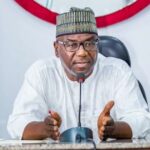Vice-President Kashim Shettima has tasked Nigerians to recognize that change is a painful process, assuring them that with the efforts of the present administration, Nigeria will soon get out of hardship and be on the path of sustained growth.
The Vice President also assured that the federal government will integrate technology into the nation’s educational infrastructure to address human capacity and resource challenges to improve learning outcomes.
He said this during a meeting with the World Bank Nigeria team at the Presidential Villa Abuja, on Wednesday.
He said: “Be rest assured that where there is a will, there is always a way. Change is a very painful percolation process. But I know we will get out of this very soon and be on the path of sustained growth.”
Shettima referenced India’s success in using KYAN smart class solutions to teach students in rural areas, suggesting that similar innovations could revolutionise Nigeria’s education system.
“In India, Kyan technology is used to teach 50,000 pupils in rural and impoverished areas. I believe technology will help us upgrade our education system significantly,” he noted.
He also called for a holistic approach to education reform, including improving infrastructure, teacher training, and the implementation of technology.
“We need a comprehensive plan to address the gaps in our education system as quickly as possible. We must not allow these challenges to persist. The federal government is committed to making the necessary changes, but we need the cooperation of all stakeholders, including state governors, to drive this transformation forward,” he said.
Earlier during their presentation on Opportunities for Prosperity and Equity in Nigeria’s Human Capital, leader of the team and World Bank’s Country Director for Nigeria, Dr. Ndiamé Diop, outlined the focus on improving governance, health, and education across the 36 states of the federation and the Federal Capital Territory (FCT).
The projects, HOPE – Governance, HOPE Primary Health Care and HOPE Basic Education, are part of a broader push to reform governance processes, primary healthcare and education, with an emphasis on human capital development.
“We are working to reinvigorate governance, primary healthcare, and education facilities across the country,” Diop said.

 Join Daily Trust WhatsApp Community For Quick Access To News and Happenings Around You.
Join Daily Trust WhatsApp Community For Quick Access To News and Happenings Around You.


